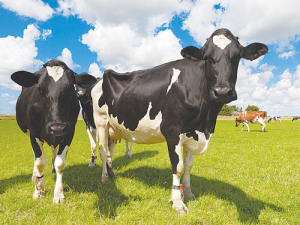2024/25 Dairy Statistics: NZ dairy farmers boost production with fewer cows
According to the New Zealand Dairy Statistics 2024/25 report, New Zealand dairy farmers are achieving more with fewer cows.
 LIC says a bacterial contamination is the likely cause of a semen quality issue that impacted 1,127 herds last year.
LIC says a bacterial contamination is the likely cause of a semen quality issue that impacted 1,127 herds last year.
A bacterial contamination is the likely cause of a semen quality issue that impacted 1,127 herds in October last year, says LIC.
Last year, impacted farmers were notified by the farmer-owned co-operative of a quality issue that affected some batches of semen that were inseminated on farms on 17-19 October and 23-25 October. Cows did get in calf from the inseminations on the affected days, but a noticeably lower number than LIC would expect. Credit and goodwill packages totalling $2m were offered to farmers to support recovery.
LIC chief executive, David Chin, says every possibility was investigated and multiple scenarios were recreated using the semen from the impacted days which is routinely frozen and stored for research purposes.
“While we were able to narrow it down to a possible cause, it was not possible to identify the exact root cause of the bacterial contamination. We considered every possibility, from the bull farm to on-farm insemination, and were able to rule out many possible causes by process of elimination.
“We are now focused on implementing the recommendations that stemmed from the investigation to reduce the likelihood of this ever happening again.”
LIC will have over half of the recommendations in place by March this year, with many improvements already implemented.
“When we first identified this issue, we made immediate changes to our quality control checking process. Now, daily quality control checks occur at 4am every morning prior to insemination on farm on that given day. This change means we can notify AB Technicians of any issues and ask them to use back up semen instead, so we can still get cows in calf,” says Chin.
Chin acknowledges that for impacted farmers the full extent of the situation is now coming to light as they complete pregnancy testing.
“Getting cows in calf is what we do – and we have a very good track record at doing just that. We acknowledge the impact this situation caused for individual cows in herds and we are disappointed that, in this instance, we didn’t deliver to the high standard farmers expect.
“We are not closing the book on this – as a farmer-owned co-op we are always looking at ways we can improve our processes to deliver farmers the right tools to breed the most sustainable and profitable herds - now and into the future,” says Chin.
Legal controls on the movement of fruits and vegetables are now in place in Auckland’s Mt Roskill suburb, says Biosecurity New Zealand Commissioner North Mike Inglis.
Arable growers worried that some weeds in their crops may have developed herbicide resistance can now get the suspected plants tested for free.
Fruit growers and exporters are worried following the discovery of a male Queensland fruit fly in Auckland this week.
Dairy prices have jumped in the overnight Global Dairy Trade (GDT) auction, breaking a five-month negative streak.
Alliance Group chief executive Willie Wiese is leaving the company after three years in the role.
A booklet produced in 2025 by the Rotoiti 15 trust, Department of Conservation and Scion – now part of the Bioeconomy Science Institute – aims to help people identify insect pests and diseases.

OPINION: The release of the Natural Environment Bill and Planning Bill to replace the Resource Management Act is a red-letter day…
OPINION: Federated Farmers has launched a new campaign, swapping ‘The Twelve Days of Christmas’ for ‘The Twelve Pests of Christmas’ to…